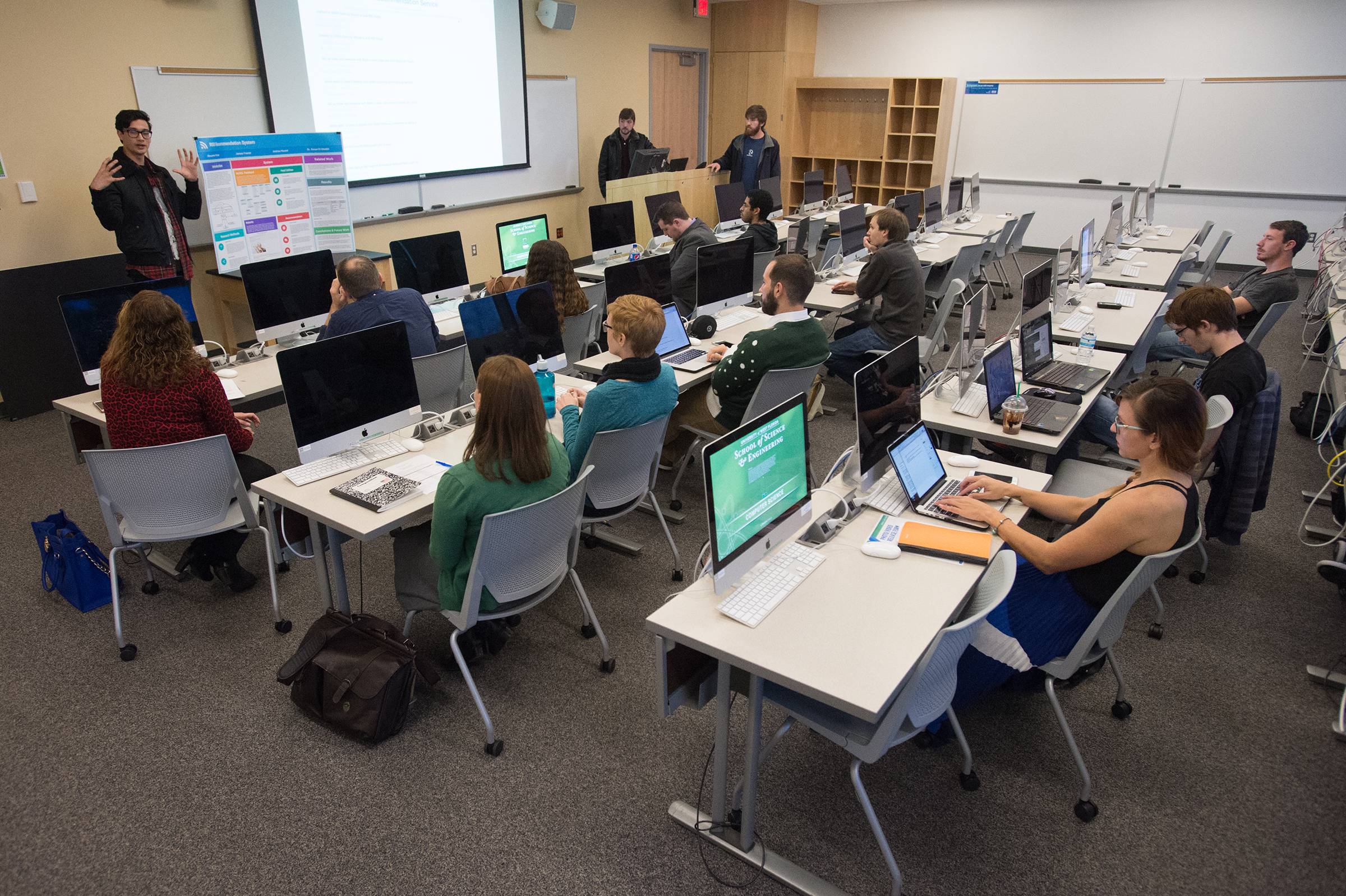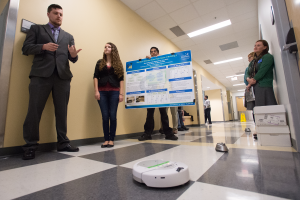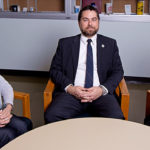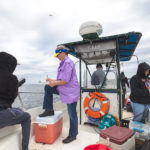AI Course Innovates at UWF
Pensacola – Predicting stock prices and giving a tour of a building are very different tasks. But University of West Florida students last semester used the same tool – artificial intelligence – to accomplish both of them.

Students in an AI programming course taught by Dr. Eman El-Sheikh, interim director of the UWF Center for Cybersecurity and associate dean of College of Science and Engineering, formed teams, identified problems and used AI to find solutions.
“The course gives students an opportunity to gain research and development experience while solving complex problems,” El-Sheikh said. “Part of their evaluation focuses on whether they used AI principles and techniques to effectively solve the problem. And then part focused on whether they developed a useful and usable system.”
The projects ran the gamut.
Last semester, students Prakash Dhimal and Kevin Sanford took historical stock prices from Yahoo Finance and applied machine learning methods to look at trends and then predict a price for the closing dates.
“We wanted to quantify stock price and, analysts, they could spend hours and days doing that. But we wanted to automate that using machine learning,” said Dhimal, a junior who is majoring in computer science.
El-Sheikh said when she first arrived at UWF about 15 years ago, the University had a graduate AI course but didn’t have any undergraduate classes focused on AI. She developed several courses and has been teaching them to students since 2009.
As evidence of the increasing prominence of the field, El-Sheikh remembered telling students years ago about a vehicle that drove across the country with autonomous control of the steering 98 percent of the trip. It had been developed as an academic research project. Now autonomous vehicles are approved in multiple states, including Florida. And more companies are developing them, she said.
“Advances like these provide great motivation for students because they demonstrate how research projects can lead to significant changes in our world,” El- Sheikh said. “At UWF, we try to actively engage students in research projects starting at the undergraduate level.”
Continuing developments in the usability of AI should continue to pique students’ interest in the field, said Dr. Ken Ford, founder and CEO of the Florida Institute for Human & Machine Cognition, a nonprofit research institute in Pensacola.
“Natural language dialogue with computers, like (Apple’s) Siri, but better, is of substantial interest to many students,” Ford said. “Also, students tend to find robotics quite motivating.”
Travis White and Mikayla Timm, both juniors who are majoring in computer science, were part of a team last semester that programmed a robot to navigate the hallways on the first floor of the College of Science and Engineering building. The robot uses several sensors and AI algorithms to detect walls and avoid obstacles.
 Students Travis White and Mikayla Timm present their robot navigation project in Dr. Eman El-Sheikh’s class in the College of Science & Engineering.
Students Travis White and Mikayla Timm present their robot navigation project in Dr. Eman El-Sheikh’s class in the College of Science & Engineering.
Another group of students, Alex Farrar, James Frazier and Andrew Havard, used AI to develop an RSS system that recommends news stories to users based on keywords from other content that they’ve searched. The system uses three types of recommendation strategies: collaborative, hybrid and content-based.
“The content-based basically goes through your history of keywords from stories you’ve clicked and recommends you news stories that you haven’t seen with those keywords in them,” Frazier said while giving an overview of the project to the AI programming class. “And then the hybrid collaboration gets the top stories from the past few hours and then goes through those and finds the ones that you would like based on your keyword history and the keywords that are in those.”
El-Sheikh said she encourages students in her AI class to also present their projects at the UWF Student Scholars Symposium and research conference. She also started the UWF Artificial Intelligence Research Group at UWF that’s open to all students who want to learn more about the field and are interested in working on AI research projects.
In the future, El-Sheikh said she’d like to facilitate projects in which AI students team up with students from other disciplines to solve problems relevant to the community. She’d also like to invite community and industry representatives to the University to view student presentations.
“Capstone projects like these are great opportunities for our students to gain essential skills for career success, including communication and teamwork – in addition to disciplinary knowledge and skills – and for the community to see all the work that our students are capable of,” she said.
Ford believes interest in AI and teaching of the field will continue to flourish at colleges and universities.
“AI and related topics continue to be of great interest to students and researchers alike,” Ford said. “Like many other subjects, interest in AI waxes and wanes in a sort of cyclical fashion. And it’s currently in a sustained up cycle.”



